SABA Head Says Today's Croatia Would Not Exist Without Partisan Struggle
ZAGREB, 9 May 2022 - The head of the Croatian Federation of Antifascist Fighters and Antifascists (SABA), Franjo Habulin, said on Monday, on the occasion of the Day of Victory over Fascism, that today's Croatia would not exist without the struggle of the World War II Partisan fighters.
"Croatia was founded on the antifascist struggle. Today's Croatia would not exist without the Partisan struggle," Habulin said at Zagreb's Mirogoj cemetery after a SABA delegation laid wreaths at the Tomb of the People's Heroes.
Habulin said that by marking the Day of Victory over Fascism they were remembering all who had given their lives so that Croatia could be an independent and free European country.
Speaking of the significance of 9 May 1945, when the forces of Nazi Germany laid down their arms after signing an unconditional surrender, which marked the end of World War II, Habulin said that today's Europe would not exist without the joint struggle of European countries on the side of the antifascist coalition, recalling that today was also Europe Day.
He added that in the past 30 years there had unfortunately existed in Croatia "open pro-Ustasha right-wing political tendencies", which distorted historical facts.
Asked to comment on the passivity of the government and the parliament in commemorating today's anniversary, Habulin said that those institutions should do much more than just pay lip service to antifascism.
Wreaths and flowers were laid at the Tomb of the People's Heroes also by President Zoran Milanović's envoy Melita Mulić, delegations of the Social Democratic Party (SDP) and the Social Democrats of Croatia, and of the embassies of France, Azerbaijan and Kazakhstan, while the SABA delegation also laid a wreath at the city's Dotršćina memorial park.
For more, check out our politics section.
Bonfires Lit by River Sava in Zagreb to Commemorate WWII Liberation
ZAGREB, 8 May 2022 - The Network of Antifascist Women and the Alliance of Antifascist Fighters and Antifascists lit bonfires on the bank of the River Sava in Zagreb on Saturday evening in tribute to the Partisan units that liberated the Croatian capital on 8 May 1945.
The event was attended by Mayor Tomislav Tomašević, who said that it was the seventh year now that the liberation of Zagreb from Ustasha and fascist occupation had been commemorated by building bonfires by the Sava.
"During the Second World War and the difficult times of occupation, Zagreb was never subdued. Numerous residents of the city, together with Partisans from throughout Croatia, joined the National Liberation Movement and the Women's Antifascist Front, engaging in subversive operations against the occupying army and quislings. They were also hiding people who faced deportation to certain death, and put up resistance," the mayor said.
He said he was paying tribute to the 30,000 residents of Zagreb who had sacrificed their lives or had been the victims of the Ustasha and fascist terror.
"The units that liberated Zagreb did so on the wings of social justice, faith in equality and internationalism, which are the values that we should promote today," Tomašević said, adding that society should be built on class and gender equality.
For more, check out our politics section.
PM Andrej Plenković: Government is Sponsor of Antifascism Anniversary
ZAGREB, 22 June, 2021 - Prime Minister Andrej Plenković said at the Antifascist Struggle Day commemoration on Tuesday that this year the government was organising the observation of that public holiday and that it would be the same in the future, noting that the turbulent time of war should be viewed in all its complexity.
"I am pleased to greet you on behalf of the government on the occasion of Antifascist Struggle Day here in Brezovica forest," said Prime Minister Plenković in his speech at the central Antifascist Stuggle Day commemoration at Brezovica Memorial Park near Sisak, adding that the holiday was established in 1991 at the initiative of then president Franjo Tuđman.
The prime minister recalled that at the beginning of summer 1914 Hitler's Germany had taken control of most of Europe and had begun its senseless and criminal policy in which about six million European Jews had been killed and that after the occupation of Yugoslavia, "the Quisling NDH regime" had been established in Croatia.
Croatia had largest resistance movement in Europe relative to its population
"In reality Croatia was divided into German and Italian occupation zones, while most of Dalmatia, Gorski Kotar and Primorje were annexed to Italy after NDH authorities ceded them to fascist Italy, and racial laws were passed against Jews, Roma and Serbs," Plenković said.
He pointed out that 80 years ago about 70 fighters, mostly Croatian, had established the first Sisak Partisan resistance movement in Brezovica forest.
"Among them was a young Janko Bobetko, who would become a Croatian Army General and Chief of Staff of the Armed Forces in the 1990s," the prime minister said.
He added that the Partisan movement in Croatia had 7,000 members, including many Croatian Serbs.
Plenković underscored that Croatia had had the largest resistance movement in Europe relative to its population.
"Last year we marked the 25th anniversary of the great victory in Operation Storm and the Homeland War, and then I said that we also mourned the victims of crimes committed by Croatia, which unfortunately happened, because a legitimate right to defence is not an excuse for crimes," the prime minister said.
Totalitarian regime in Yugoslavia betrayed antifascists
He added that regardless of the merits of Croatian Partisans, that turbulent time should be viewed in all its complexity.
Plenković said he was thinking primarily of the post-war crimes of the JNA (Yugoslav People's Army) near Bleiburg, Austria and the mass executions of disarmed soldiers and civilians along marches back to Yugoslavia, which he said was traumatic for many families, and which deepened the disastrous divisions in post-war Croatia.
He also underscored that the totalitarian regime in Yugoslavia had betrayed antifascists.
Here I'm thinking of post-war purges of political dissidents, such as the persecution of the Blessed Cardinal (Alojzije) Stepinac, who in his sermons publicly opposed the persecution of Serbs and Jews, and saved many of them from death, Plenković said.
Close divisions still present in society
Plenković said that the time had come for us Croatia a society to take a more sober view of the events of that time and to better evaluate the contribution of the Croatian antifascist resistance to Nazism.
"Only in that way will we close the divisions still present in our society and build the unity necessary to face the challenges ahead of us. Today we finally have a free democratic Croatia, a member of the EU and NATO, whose foundations are in the democratically expressed will of citizens and the victory of the defenders in the Homeland War, which also implies the value of antifascism," Plenković stressed.
He said that after the pandemic and last year's earthquakes, and in the context of increasingly rapid climate change, which would be by far the greatest challenge for the world in the future, Croatia needed unity and to look to the future more than ever.
"Therefore, it is up to all of us to rise to the task that awaits us," Plenković said.
For more about politics in Croatia, follow TCN's dedicated page.
President Zoran Milanović: "No Progress Without Harmony Among Croatian People"
ZAGREB, 22 June, 2021 - President Zoran Milanović attended a concert by the Croatian Navy Orchestra held in commemoration of Antifascist Struggle Day in Split on Monday evening, where he said that without harmony among the Croatian people there cannot be any progress.
"Without that harmony among the Croatian people, there cannot be any progress. We are few and only with joint effort, regardless of how worn out that may sound but it is worth repeating, can we go on further and can we progress," Milanović underscored.
This gathering here today, peaceful, civilised, civic, leftist, as well as traditionally Dalmatian, is an indicator that this is a normal and peaceful society that needs only a little to agree on some matters, he said.
He announced that he would attend the Antifascist Struggle Day commemoration in Brezovica on Tuesday, where the first antifascist uprising took place.
Milanović said that he had come to Split "because of his grandfather and his brother and his grandmother and her brothers who did not go to war as antifascists, because they did not know what that meant."
He named those killed in the First Split Detachment comprising young communists from Split, saying that from today's comfortable perspective, that is difficult to comprehend.
"We do not have people like that today. They were the spark that lit the uprising, the people's uprising... I know that this day, these days, this holiday bothers some people in Croatia. I know that there was injustice, murder, unreason, because every revolution is rough, raw, unjust and quite often, if it doesn't eat them, it harms its children but that was the price they had to pay," he confirmed.
He recalled that the First Split Detachment comprised young communists from Split. "To be fair, they weren't fighters for democracy, they were revolutionaries, fierce, sometimes unjust," said Milanović.
He added that fifty years later some other people, Croatian fighters for freedom in the Homeland War, were prepared to courageously enter into battle, risking their lives.
Recently-elected Split Mayor Ivica Puljak attended the commemoration. It is our permanent obligation to create a society of equal opportunities in which freedom and mutual respect is accessible to everyone, he said.
"We always have to remember the fact that Croatia was founded on the values of antifascism and the Homeland War. In the hope that the contemporary challenges bring us even closer and strengthen our efforts to build a tolerant country open to everyone and to promote good on behalf of our future and the future of our children, I congratulate everyone on Antifascist Struggle Day," said Puljak.
The commemoration in Split was organised by the City of Split and Split-Dalmatia County as well as the county and city associations of antifascist fighters and antifascists, and the Association of Homeland War Veterans and Antifascists.
For more about politics in Croatia, follow TCN's dedicated page.
Highlights of the Week: 5 Big Events in Croatia from May 3-9, 2021
May 7, 2021 - TCN's regular retrospect of Highlights of the week, through the selection of TCN's reporter Ivor Kruljac.
President Milanović loved by locals in Plaški. Firefighters quickly reacted to the fire in Zagreb recycle yard. Pula celebrated its liberation while Šibenik received new doses of coronavirus vaccines. Dinamo and Hajduk end their match in a tie. Overall another interesting week in Croatia, and here are more details on all highlights.
Highlights of the week: President Milanović loved in Plaški county
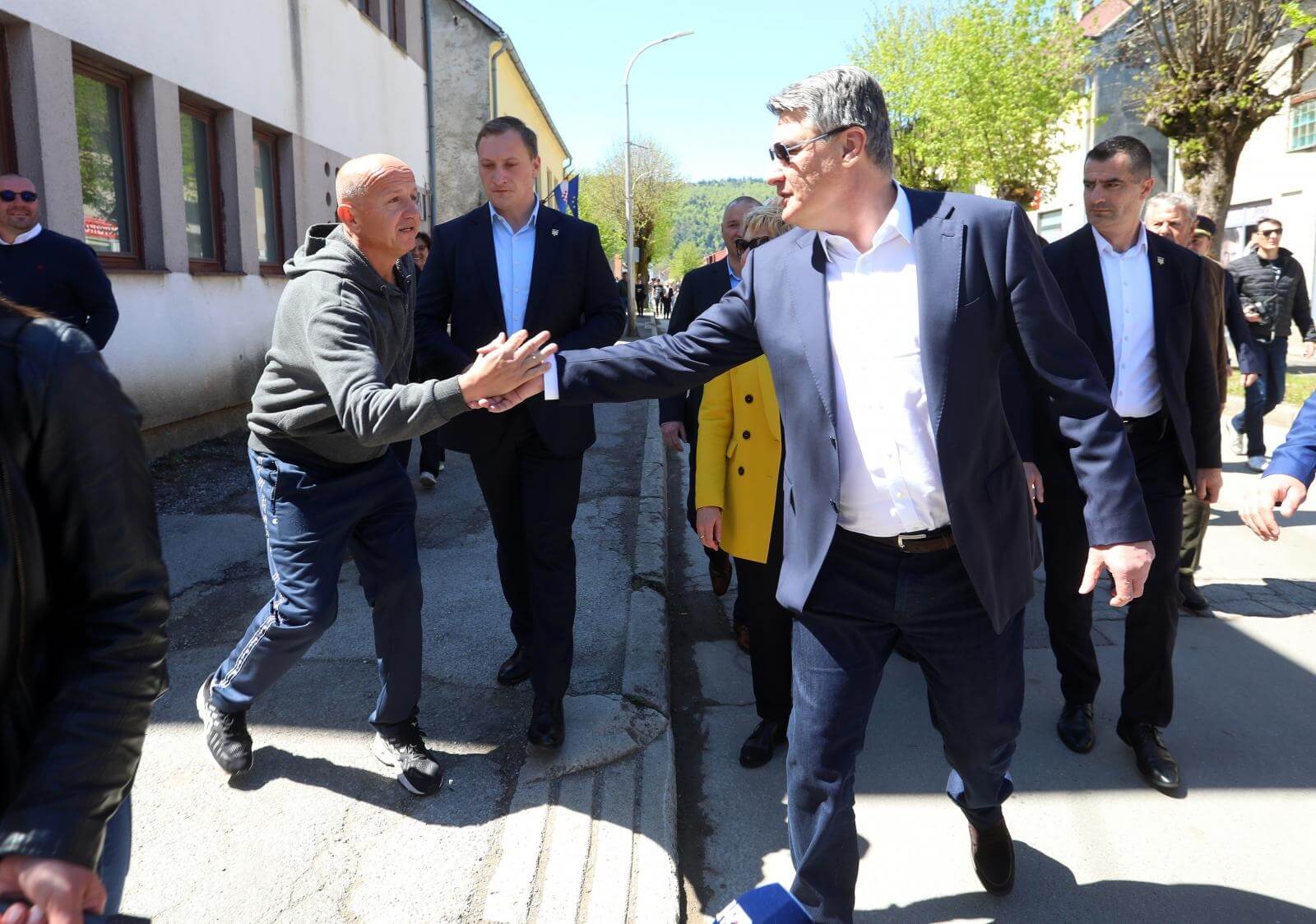
© Kristina Stedul Fabac/ PIXSELL
Croatian president Zoran Milanović visited Plaški county near Ogulin on Tuesday to visit the newly-build Firefighter's home and Plaški Culture Home. The locals welcomed president Milanović with ovations, and many use the opportunity to handshake and take a photo with the president. As Večernji List reports, Milanović took the visit as an opportunity to comment on the hate speech incident at Borovo Selo. He stated that the President of Serbian National Council Milorad Pupovac and Croatian Prime Minister „should use the police, but they don't, they are causing incidents.
Highlights of the Week: Pula celebrating its liberation in WW2
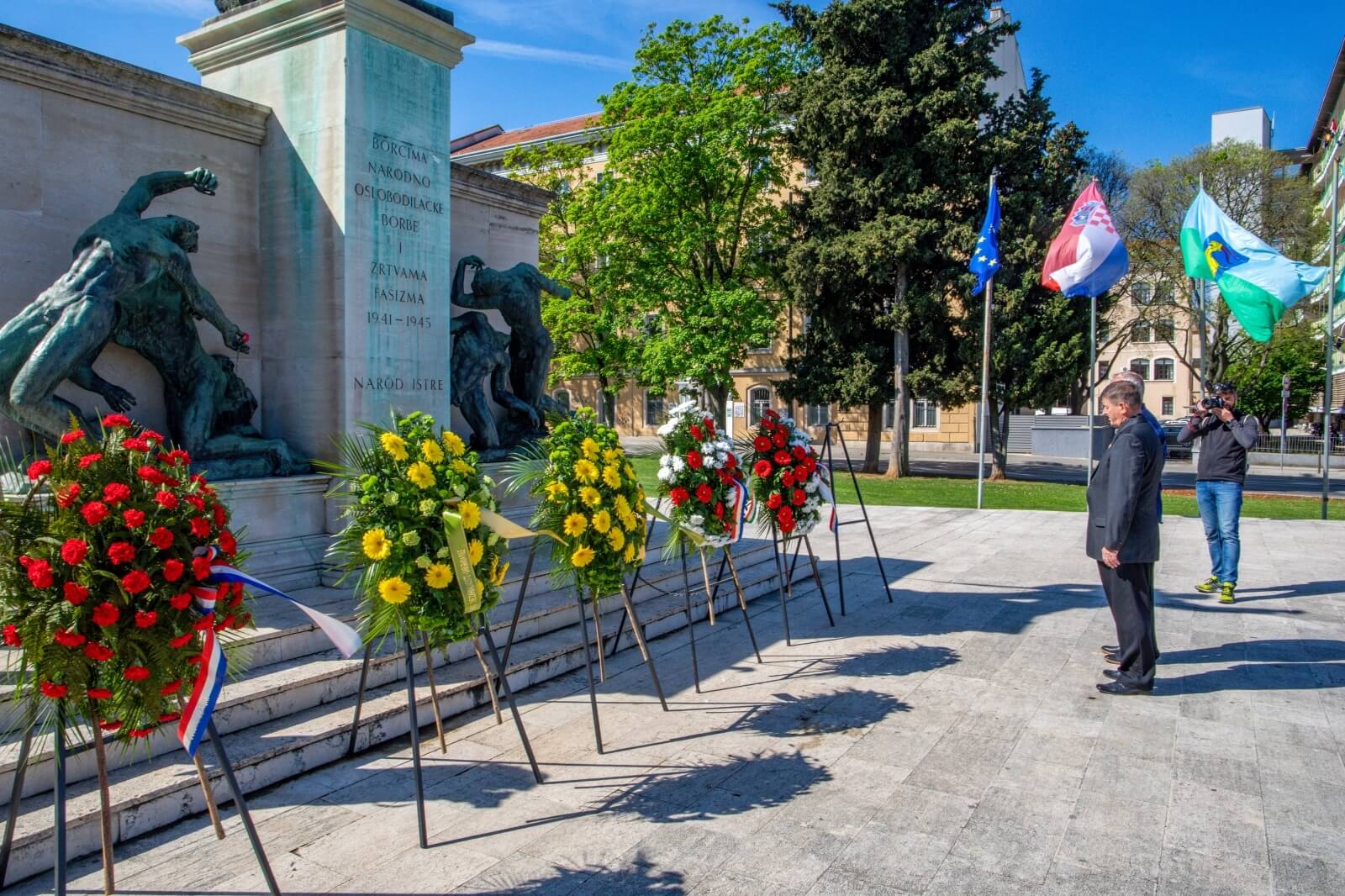
© Srecko Niketic/ PIXSELL
Pula celebrated its annual liberation day and the Pula City Day, marked on May 5. In Tito's park, the traditional commemoration to the fallen WW2 soldiers of Tito's partisan army saw Tiziano Sošić (president of Pula City Council), Elena Puh Belci (vice mayor of Pula), Aleksandar Matić (chief of the City of Pula Office) and Fabrizio Radin (vice-county ruler of Istria county) paid their respects. Representatives of associations of anti-fascist fighters and anti-fascist of the city of Pula were present too.
Highlights of the Week: Dinamo and Hajduk end with an even score 1:1
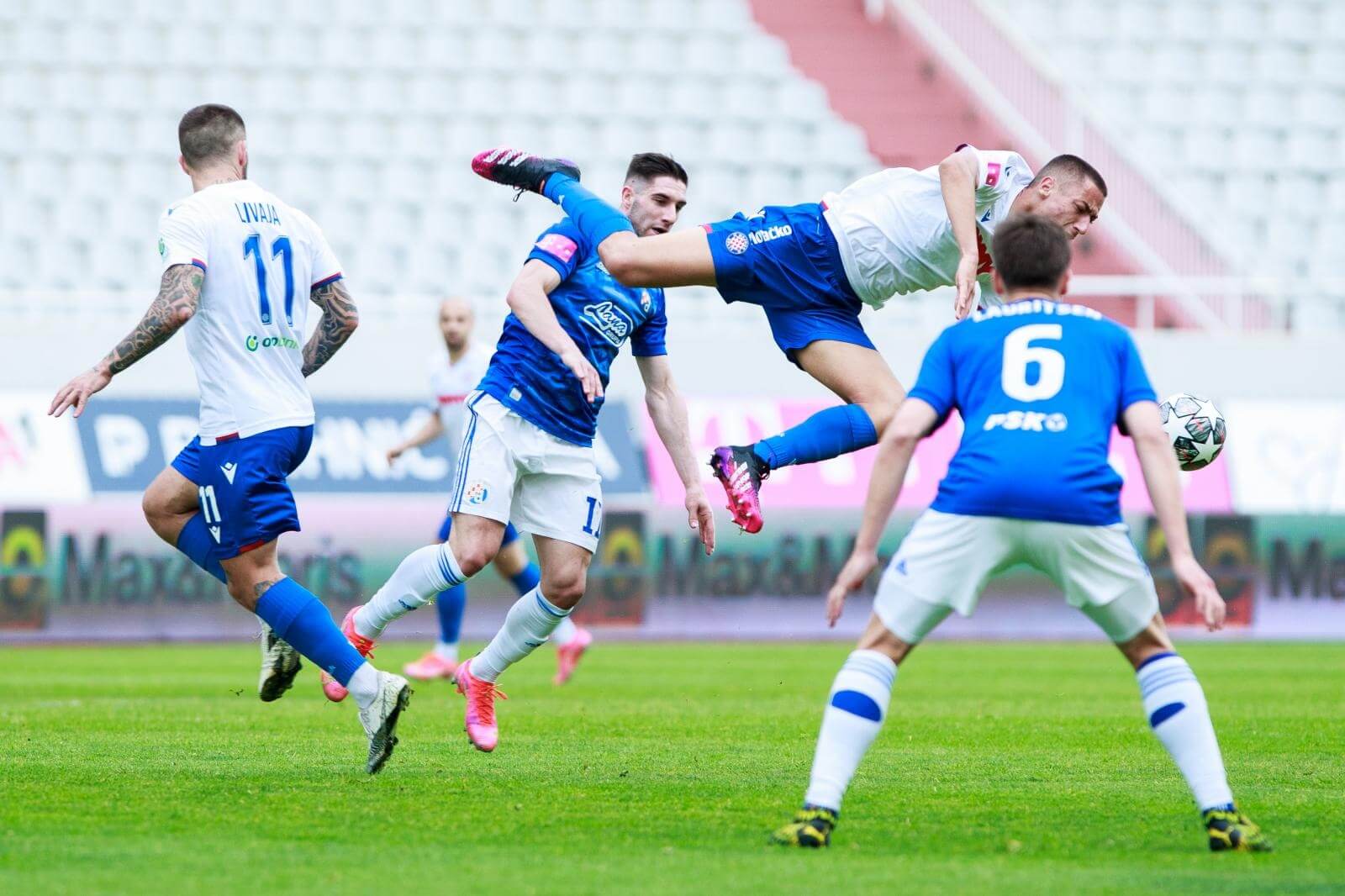
© Milan Sabic/ PIXSELL
Hajduk and Dinamo's eternal opponents played another game at Hajduk's home of Poljud Stadium in Split on Wednesday. The match was the 22nd round in Croatian First League, and fans couldn't wait for it as the game was postponed.
Hajduk opened the match well and had a chance to take the lead in the first 20 seconds. Kačaniklić received an excellent long ball and ran on the right side. He rushed into the penalty area and shot diagonally, but Livaković came out and closed his corner. Dinamo improved and took the lead in the 16th minute with a goal by Majer, and Livaja returned the favor in the 44th minute. Diamantakos hit the crossbar in the final minutes of the match but without success.
After three victories in the previous three clashes with Hajduk this season, Dinamo failed to achieve maximum performance and almost mathematically secured the title but entered the last four rounds with a seven-point advantage over Osijek. The fail happened despite Dinamo facing Hajduk with the strongest possible lineup.
Highlights of the Week: Vaccination in Šibenik continues successfully
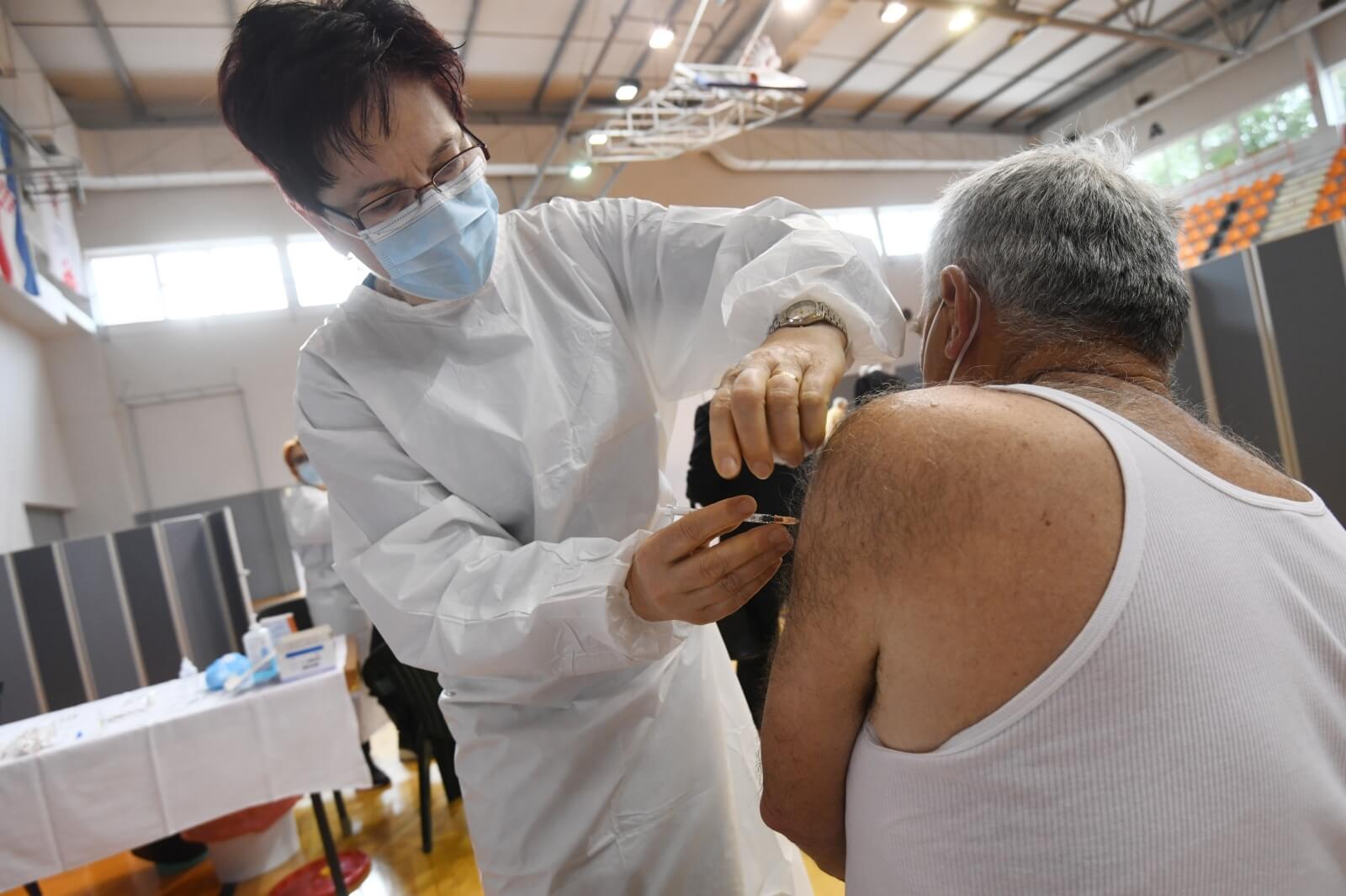
© Hrvoje Jelavic/ PIXSELL
Larger quantities of vaccines came to Šibenik on Friday, allowing vaccination in Baldeki Sports Hall to go without problems for the second day in the row. The vaccination attracts a number of citizens, so the area got quite crowded.
Highlights of the Week: Recycling yard in Zagreb on fire, reasons unclear
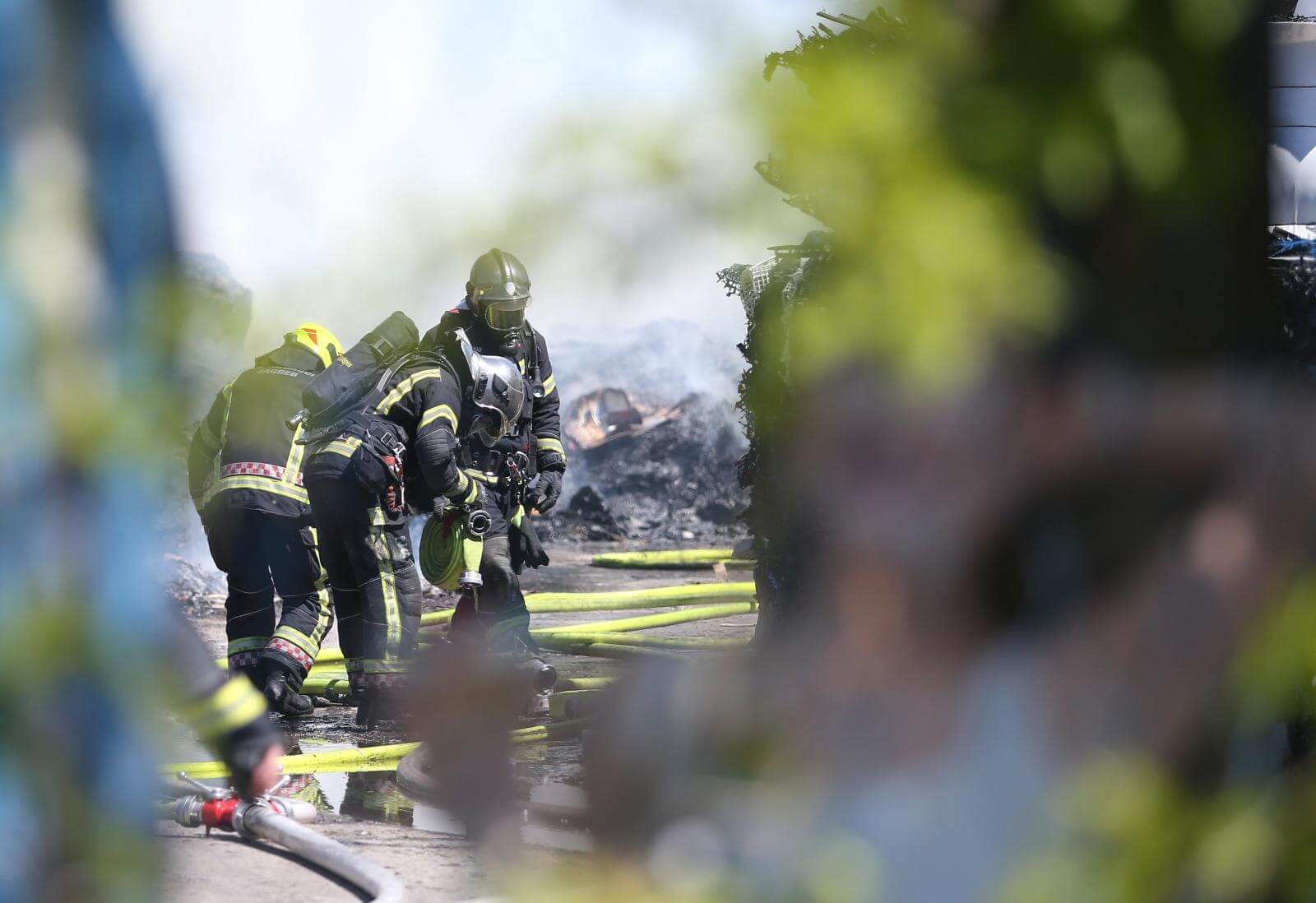
© Matija Habljak/ PIXSELL
Zagreb's recycling yard, located on Sarajevska Cesta in Novi Zagreb, was victimized by fire but quickly localized and put under control on Tuesday. The fire caught four containers, and 21 firefighters with six fire trucks rushed to the field. Police investigated the cause of the fire, but the reason is, for the moment, unknown. Firefighters managed to operate despite the lack of hydrants, and the thick white smoke was noticed by citizens who live in the buildings close to the yard, reported Večernji List.
To learn more about Croatia, have a look at our newly launched TC website.
For more about news in Croatia, follow TCN's dedicated page.


